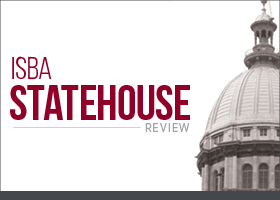ISBA Statehouse Review for June 5, 2019
 ISBA Director of Legislative Affairs Jim Covington reviews legislation in Springfield of interest to ISBA members. This week he covers legal transcription, driver’s licenses and child support, the Cannabis Regulation Tax Act, disposition of remains, the Illinois Trust Code, forensic interviews on children, medical cannabis, and toxic torts.
ISBA Director of Legislative Affairs Jim Covington reviews legislation in Springfield of interest to ISBA members. This week he covers legal transcription, driver’s licenses and child support, the Cannabis Regulation Tax Act, disposition of remains, the Illinois Trust Code, forensic interviews on children, medical cannabis, and toxic torts.
Legal transcription. Senate Bill 2128 (Harmon, D-Oak Park; Zalewski, D-Chicago) creates a licensed activity of the “practice of voice writer reporting.” This means reporting by the use of a system of repeating words of the speaker into a closed-microphone voice-dictation silencer that is capable of digital translation into text. It could be used for grand jury proceedings, court proceedings, court-related proceedings, pretrial examinations, depositions, motions, and related proceedings of like character.
Effective January 1, 2020.
Driver’s licenses and child support. Senate Bill 1473 (Hunter, D-Chicago; Ford, D-Chicago) gives the Department of Healthcare and Family Services more flexibility on if and how it will collect interest on IV-D cases to give appropriate relief for obligors in the right cases. The revisions to the Illinois Vehicle Code would eliminate the existing provision that does not allow the courts or HFS to work with an obligor if their license is suspended more than once for non-payment of child support.
Effective immediately.
The Cannabis Regulation and Tax Act. House Bill 1438 (Cassidy, D-Chicago; Steans, D-Chicago) decriminalizes small amounts of cannabis and replaces it with a tax and regulation system. A resident of Illinois (21 or older) may purchase cannabis products and possess 30 grams of cannabis flower, no more than 500 mg of THC in cannabis-infused product, and five grams of cannabis concentrate. It creates an automatic expungement through the governor’s clemency process for convictions up to 30 grams. For amounts of 30-500 grams, the state’s attorney or the individual can petition the court to vacate the conviction. It also makes other changes.
Effective January 1, 2020.
Disposition of remains. House Bill 1455 (Bourne, R-Litchfield; Manar, D-Bunker Hill) requires that any dispute concerning the right to control the disposition of a decedent's remains be resolved by a court within 30 days of the dispute being filed with the court.
Effective January 1, 2020.
Illinois Trust Code. House Bill 1471 (Ann Williams, D-Chicago; Mulroe, D-Chicago) is an Illinois-centric version of the Uniform Trust Code. It is intended to modernize trust law in the state of Illinois, codify common law concepts that currently apply to trusts, and provide uniformity in relation to trust law in other states.
Effective January 1, 2020.
Forensic interviews of children. House Bill 909 (Welch, D-Westchester; Lightford, D-Westchester) provides that consent is not required for a forensic interview to be electronically recorded, but failure to do so doesn’t make the interview inadmissible. It makes a forensic interview, an electronic recording, or a transcription of either exempt from a FOIA request and may be viewed only by a court, attorneys, investigators, or other experts as part of the legal process. It may not be disseminated unless a court’s protective order so directs.
Effective January 1, 2020.
Medical cannabis. Senate Bill 2023 (Fine, D-Glenview; Morgan, D-Highwood) amends the medical cannabis law to expand the definition of “debilitating medical condition” to include autism, chronic pain, irritable bowel syndrome, migraines, osteoarthritis, anorexia nervosa, Ehlers-Danlos Syndrome, Neuro-Behcet’s Autoimmune Disease, neuropathy, polycystic kidney disease, and superior canal dehiscence syndrome.
“Certifying health care professional” is redefined to mean a physician, an advanced practice registered nurse, or a physician assistant.
Effective immediately.
Toxic torts. Senate Bill 1596 (Sims, D-Chicago; Hoffman, D-Belleville) permits civil litigation by victims of exposure to toxic substances in the workplace who are diagnosed with latent diseases after the 25-year time bar imposed by the Workers’ Compensation Act and Occupational Diseases Act. It legislatively overrules Folta v. Ferro Engineering, 2015 IL 118070.
Effective immediately.

